If you're taking a calcium channel blocker for high blood pressure, and you love your morning glass of grapefruit juice, you might be at risk - even if you take your pill hours later. This isn't a myth. It’s a well-documented, potentially dangerous interaction that affects millions of people in the U.S. alone.
Why Grapefruit Is a Problem With Calcium Channel Blockers
Grapefruit doesn’t just taste tart - it contains powerful chemicals called furanocoumarins, mainly 6',7'-dihydroxybergamottin and bergamottin. These compounds shut down an enzyme in your gut called CYP3A4, which normally breaks down certain medications before they enter your bloodstream. When this enzyme is blocked, your body absorbs way more of the drug than intended. For calcium channel blockers like felodipine, this means your blood levels can jump 3 to 5 times higher than normal. One small glass of grapefruit juice - just 200 milliliters - is enough to cause this effect. And it doesn’t go away after a few hours. Because the enzyme damage is irreversible, your body needs up to 72 hours to grow new enzymes. That means even if you drink grapefruit juice at 8 a.m. and take your pill at 8 p.m., you’re still in danger.Which Calcium Channel Blockers Are Most Affected?
Not all calcium channel blockers react the same way. The ones most at risk are the dihydropyridine (DHP) group, which includes:- Felodipine - The most sensitive. Studies show grapefruit juice can boost its levels by up to 500%.
- Nicardipine - Also highly affected. Even small amounts of grapefruit can cause dangerous spikes.
- Nimodipine - Used for brain artery spasms, this one carries a black box warning about grapefruit.
- Pranidipine - Less common in the U.S., but still risky.
- Amlodipine - The most widely prescribed CCB. It’s less affected than felodipine, but interactions still happen. Don’t assume it’s safe.
Non-dihydropyridine blockers like verapamil and diltiazem have some interaction risk, but it’s usually milder. Still, caution is advised.
What Happens When the Interaction Occurs?
When your blood levels of a calcium channel blocker spike too high, your blood pressure can drop dangerously low. Symptoms include:- Severe dizziness or lightheadedness
- Fainting or near-fainting episodes
- Fast or irregular heartbeat
- Swelling in your ankles or legs
- Flushing or sudden warmth
These effects are especially risky for older adults. One nurse practitioner in Las Vegas described a case where an elderly woman couldn’t stand up after taking her normal dose of felodipine with grapefruit juice - her body was effectively absorbing 140 mg instead of 60 mg. That’s not a typo. That’s a medical emergency waiting to happen.
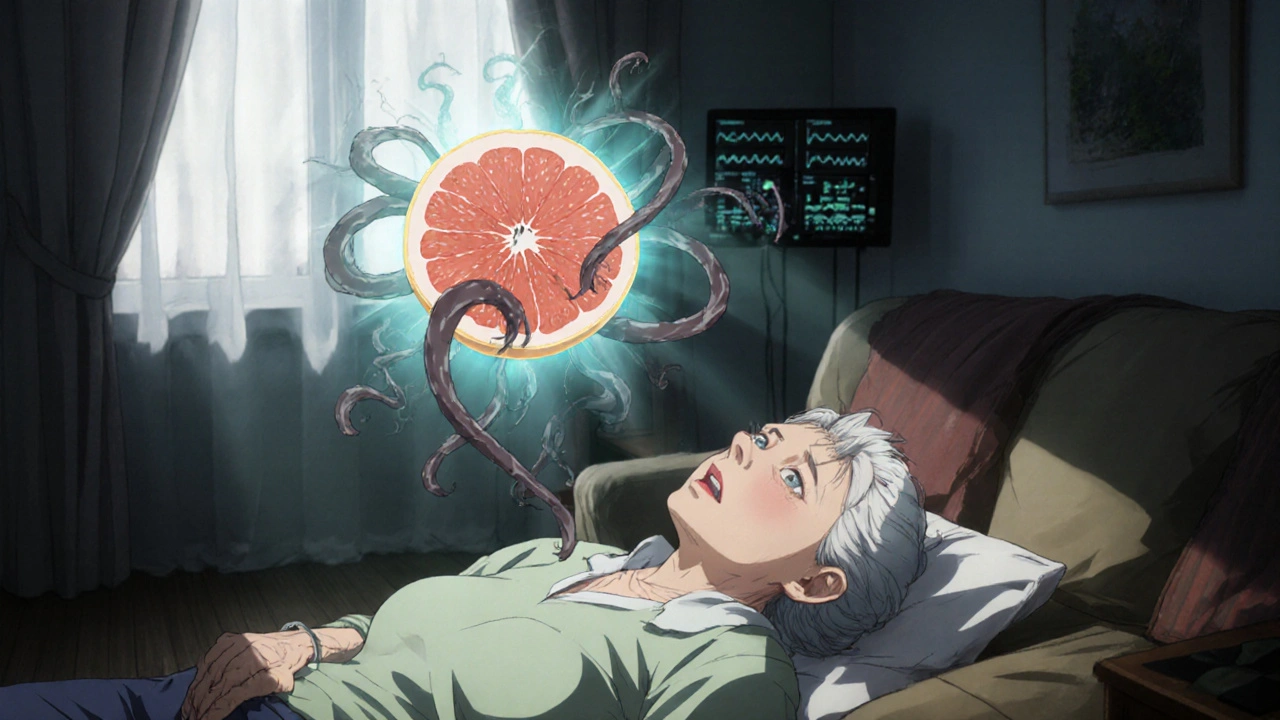
What About Other Citrus Fruits?
Grapefruit isn’t the only citrus fruit to worry about. Seville (sour) oranges and tangelos also contain high levels of furanocoumarins and should be avoided. Even orange marmalade made from Seville oranges can trigger the interaction.Regular sweet oranges - the kind you find in grocery stores - are generally safe. They have almost no furanocoumarins. Same goes for tangerines and clementines. But don’t assume all orange-flavored products are okay. Some juices or supplements may contain grapefruit extract or Seville orange concentrate. Always check the label.
What Should You Do Instead?
If you’re on a calcium channel blocker and you like citrus, here’s your practical plan:- Stop grapefruit and Seville oranges completely. No exceptions. Even occasional use is risky.
- Check your medication label. Felodipine, nimodipine, and others have explicit warnings. If it’s not listed, ask your pharmacist.
- Ask about alternatives. Amlodipine is the safest CCB option, but it’s not risk-free. Consider switching to an ACE inhibitor like lisinopril, an ARB like valsartan, a thiazide diuretic like hydrochlorothiazide, or a beta blocker like metoprolol - all of which have no known grapefruit interaction.
- Don’t rely on timing. Taking your pill at night won’t help if you had grapefruit at breakfast. The enzyme stays blocked for days.
- Talk to your pharmacist. They see this interaction every day. They can flag risky combinations before you even start the medication.
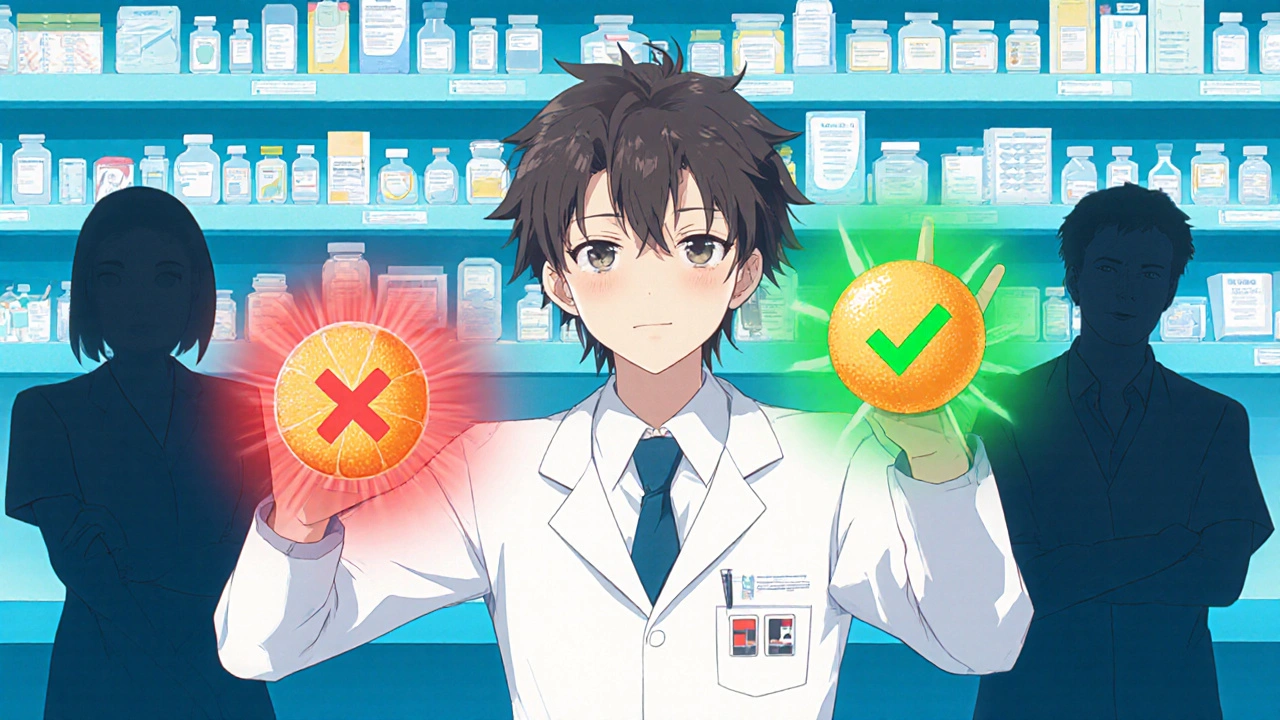
Why Do So Many People Still Get Caught?
Despite decades of research, this interaction remains dangerously underrecognized. A 2022 survey found only 37% of primary care doctors routinely ask patients about grapefruit use when prescribing calcium channel blockers. And 68% of patients had no idea their morning juice could interfere with their blood pressure pill.This isn’t just about forgetting. It’s about how little attention food-drug interactions get in medical training. Grapefruit isn’t a “maybe” risk. It’s a clear, proven, life-threatening one. Yet it’s still treated like a footnote in many clinics.
The CDC estimates that grapefruit-related drug interactions send about 15,000 people to the emergency room each year in the U.S. That’s 15,000 preventable visits - many involving seniors on multiple medications, already at higher risk for falls and complications.
What’s Being Done to Fix This?
Researchers are working on solutions. Two new extended-release versions of amlodipine are currently in Phase III clinical trials, showing a 70% reduction in grapefruit interaction. That’s promising. But those drugs aren’t on the market yet.For now, the only proven fix is behavior change. Avoid grapefruit. Talk to your doctor. Know your meds.
Bottom Line
You don’t have to give up citrus forever. Sweet oranges, tangerines, and clementines are fine. But grapefruit, Seville oranges, and tangelos? They’re off-limits if you’re on a calcium channel blocker. It’s not a suggestion. It’s a safety rule.That morning juice might taste good, but it’s not worth a trip to the ER. Your blood pressure medication is doing its job - don’t let grapefruit undo it.
Can I drink orange juice with my calcium channel blocker?
Yes, regular sweet orange juice is generally safe. It doesn’t contain the furanocoumarins found in grapefruit and Seville oranges. Stick to plain orange juice from the grocery store - avoid anything labeled "Seville orange," "bitter orange," or "tangelo." Always check the ingredient list.
What if I accidentally ate grapefruit while on a calcium channel blocker?
If you only had a small amount once, monitor yourself for dizziness, fainting, or a racing heart. Don’t panic, but don’t ignore symptoms. Call your doctor or pharmacist if you feel unwell. Going forward, avoid grapefruit completely. Even one exposure can raise your risk for the next few days.
Is amlodipine safe with grapefruit?
Amlodipine has a lower risk than felodipine or nimodipine, but it’s not risk-free. Studies show it can still interact with grapefruit, especially in higher doses or with repeated exposure. Most experts still recommend avoiding grapefruit entirely while taking amlodipine. If you’re concerned, talk to your doctor about switching to a non-interacting medication like lisinopril or hydrochlorothiazide.
How long does grapefruit affect my medication?
The enzyme-blocking effect lasts up to 72 hours after you drink grapefruit juice. That means even if you take your pill at night and had grapefruit at breakfast, you’re still at risk. Timing doesn’t prevent the interaction - only avoiding grapefruit entirely does.
Are there other foods or drinks that interact with calcium channel blockers?
Grapefruit is the biggest concern, but alcohol can also lower blood pressure and worsen side effects like dizziness. Some herbal supplements - like St. John’s wort - can reduce the effectiveness of certain calcium channel blockers. Always tell your doctor about everything you’re taking, including vitamins and teas.
What should I ask my doctor about this interaction?
Ask: "Is my specific calcium channel blocker affected by grapefruit?" and "Are there safer alternatives if I want to keep drinking citrus juice?" Also ask for a written list of foods and supplements to avoid with your medication. Many patients don’t realize their pharmacist can provide this too - ask for a medication review.


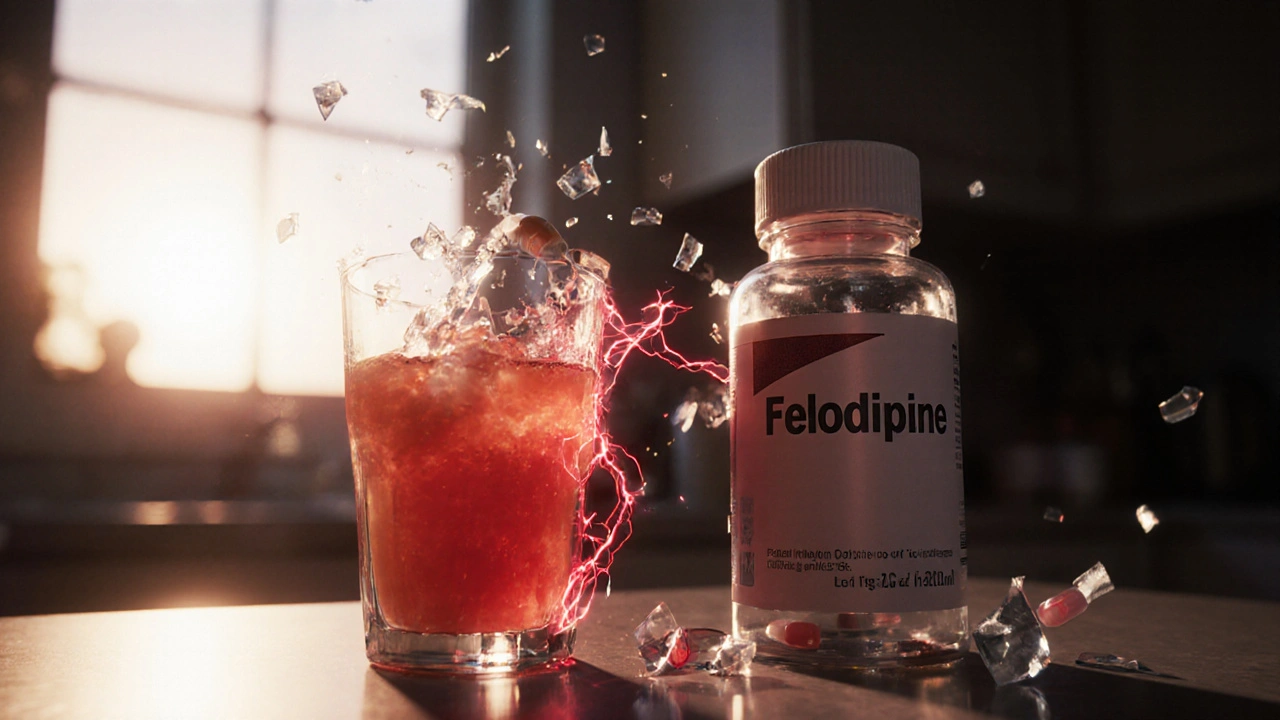
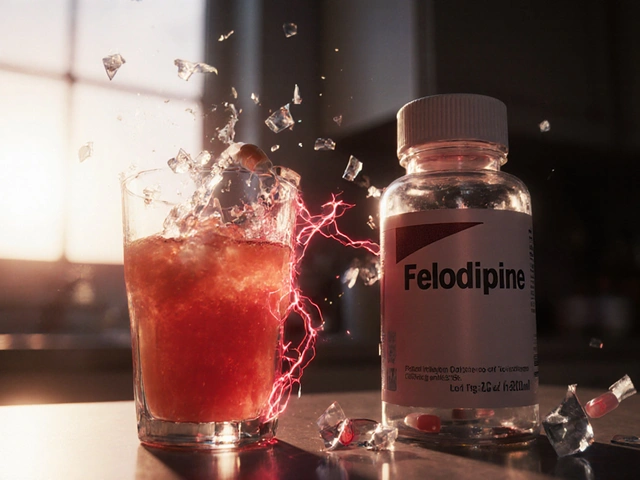
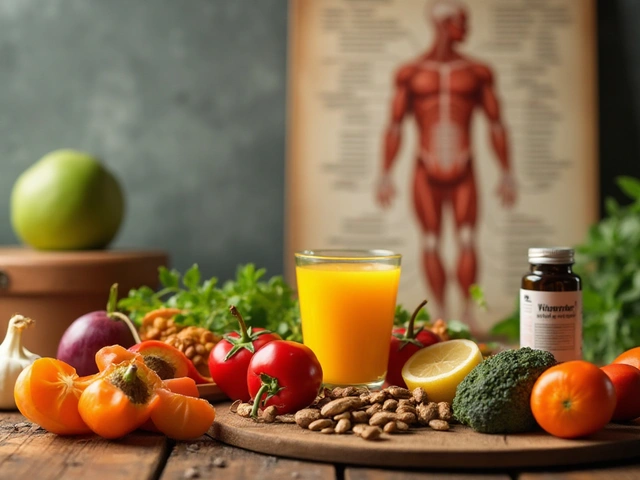

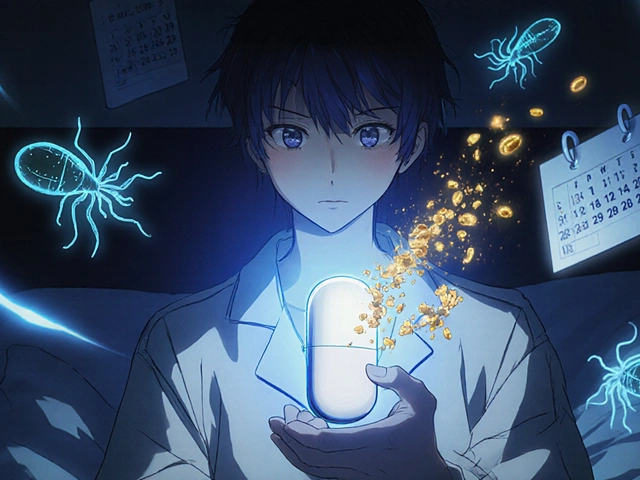

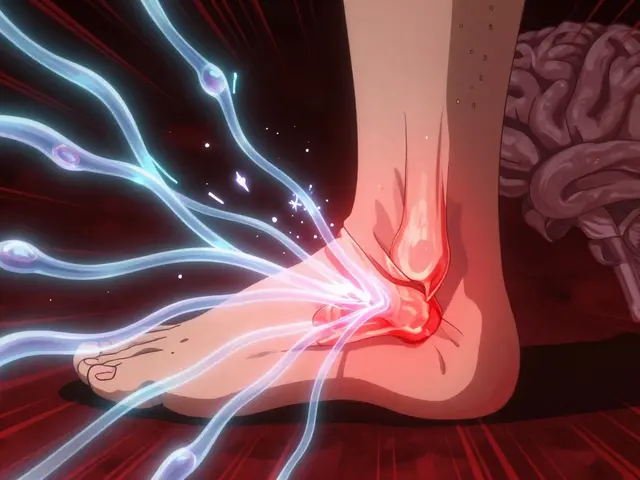
Comments (14)
Stephanie Deschenes
November 27, 2025 AT 05:24 AMJust got prescribed amlodipine last month and had no idea grapefruit was a problem. Thanks for laying this out so clearly - I’ve swapped my morning juice for plain orange juice and feel way more confident now. Small change, huge difference.
Bea Rose
November 29, 2025 AT 02:43 AM15,000 ER visits a year. All preventable. And yet, doctors still don’t ask.
Cynthia Boen
November 29, 2025 AT 07:29 AMWhy is this even a thing? If your meds interact with fruit, maybe the meds are the problem, not the fruit. Just sayin’.
Bethany Buckley
November 29, 2025 AT 10:15 AMIt’s not merely an interaction-it’s a pharmacokinetic sabotage. Furanocoumarins irreversibly inhibit CYP3A4, thereby circumventing first-pass metabolism and inducing supratherapeutic plasma concentrations. This isn’t dietary advice; it’s a biochemical breach of therapeutic integrity. And yet, we treat it like a footnote in a lifestyle blog. The medical establishment’s failure to institutionalize food-drug interaction education is a scandal. 🤦♀️
hannah mitchell
November 30, 2025 AT 11:33 AMMy grandma took felodipine and drank grapefruit juice every day for years. She’s fine. Maybe it’s just hype?
Vanessa Carpenter
December 2, 2025 AT 00:05 AMMy pharmacist actually flagged this when I picked up my prescription. She printed me a little card with safe/unsafe fruits. I keep it on my fridge. Small thing, but it saved me from a dumb mistake.
Shannon Amos
December 2, 2025 AT 00:30 AMSo… I can’t have my beloved grapefruit anymore? Cool. I’ll just start drinking motor oil instead. 😌
Jesús Vásquez pino
December 2, 2025 AT 00:40 AMWait-so if I take my pill at night and drink juice in the morning, I’m still screwed? Then why do the labels only say ‘avoid grapefruit’? Why not say ‘avoid grapefruit for 3 days’? That’s not transparency, that’s negligence.
vikas kumar
December 2, 2025 AT 04:13 AMI live in India and we don’t drink grapefruit juice here much, but I’ve seen patients on amlodipine get dizzy after eating bitter orange chutney. This is a global issue. Doctors need to ask about local foods, not just Western fruits.
Amanda Meyer
December 2, 2025 AT 06:44 AMThe fact that this interaction remains underrecognized despite decades of evidence speaks to a deeper flaw in medical education. We prioritize pharmacodynamics over pharmacokinetics. We teach drug mechanisms but not food interactions. We train clinicians to think in terms of molecules, not meals. Until we change that, these preventable ER visits will continue. This isn’t about grapefruit-it’s about systemic oversight.
stephen riyo
December 3, 2025 AT 08:42 AMWait, so… if I eat a tangelo once every blue moon, I’m basically doing a slow suicide? Like… what if I just take my pill 12 hours after? Or 10? Or 8? I mean… I’m not gonna give up citrus. I love it. 😔
Wendy Edwards
December 4, 2025 AT 13:53 PMmy doc never mentioned this. i just found out after i got dizzy at the grocery store. i was like ‘wait… is this the juice??’ now i’m scared to eat anything citrus. pls help. i just want my breakfast.
Michael Collier
December 4, 2025 AT 21:28 PMIt is imperative that healthcare providers adopt a standardized protocol for screening patients for citrus fruit consumption prior to initiating calcium channel blocker therapy. Furthermore, the integration of dietary interaction alerts into electronic health record systems should be mandated by regulatory bodies to mitigate preventable adverse events. The current state of patient education is inadequate and ethically untenable.
Jaspreet Kaur
December 6, 2025 AT 04:26 AMthe body is not a machine you can program with pills and avoid fruits like bugs. we evolved with food. if a drug cant handle orange juice then maybe the drug is too fragile. life is messy. maybe we should be making drugs that fit life not the other way around